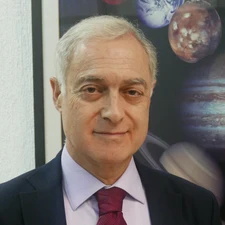Agustín Sánchez-Lavega

The 2020 David Bates Medal is awarded to Agustín Sánchez-Lavega for his exceptional contributions to solar system exploration and planetary atmospheric dynamics, as well as promoting young researchers, advancing interactions with amateur astronomers, and publicising planetary science.
EGU is honored to recognise the numerous and outstanding contributions of Augustin Sanchez-Lavega to planetary science by awarding him the 2020 David Bates Medal. Sanchez-Lavega has had a long and illustrious career as a researcher, scholar, educator and mentor. In addition to his professional activities, Sanchez-Lavega has worked hard to share the excitement of planetary science with the general public and to facilitate collaboration between professional and amateur astronomers.
Sanchez-Lavega is an internationally renowned expert in the field of dynamics of planetary atmospheres. He has published extensively on Venus, outer planets, Mars and Titan, with more than 200 journal articles, 11 book chapters, hundreds of abstracts at scientific conferences, and a successful book titled “An Introduction to Planetary Atmospheres” that is used at many universities. His publications have had a big impact on the field, which is evident from his publication and citation record.
Sanchez-Lavega has investigated the general circulation and vertical structure of Venus, Jupiter and Saturn. He led the studies of Saturn’s convective storms, being the first to report the existence of a south polar vortex and to propose that the polar hexagon wave has its roots deep in Saturn’s atmosphere. Sanchez-Lavega also made noteworthy contributions to the understanding of the structure of Jupiter’s Great Red Spot and the discovery of circumpolar Rossby waves at the North and South Poles of Jupiter. He has made valuable contributions to the understanding of Venus’ superrotation and its polar vortex.
Sanchez-Lavega has actively participated as a science team member and co-investigator on a number of past, current and in-development ESA planetary missions, including Venus Express/VIRTIS, Mars Express/VMC (Science Lead), ExoMars 2020/DS, JUICE/MAGIS, and NASA’s Mars 2020/MEDA investigation. He has served on a number of advisory boards such as ESA’s Solar System Working Group.
Sanchez-Lavega is also a respected educator. He has had a long association with Universidad del País Vasco in Bilbao, Spain, where he started first as a PhD student in early 1980’s and then ascended rapidly to the rank of full professor. He has directed the theses of 16 PhD students and two dozen masters-level students. A number of his PhD students and postdocs are now leading researchers themselves.
Sanchez-Lavega was an early promoter of planetary science in the Basque region, in particular, and Spain in general. He has been instrumental in putting Spain at the forefront of planetary science worldwide. Quoting from one letter of recommendation, “not only has he been an outstanding individual researcher across a wide range of planetary work, but he has also exercised exceptional leadership for the planetary sciences in Spain and more widely in Europe and beyond.”
In addition to his professional activities, Sanchez-Lavega has worked tirelessly to develop meaningful collaborations between amateur and professional astronomer communities and given dozens of public talks sharing new discoveries about the solar system.
In view of all his outstanding accomplishments and service to the community, Dr. Augustin Sanchez-Lavega is most deserving of the David Bates Medal of the EGU Division for Planetary and Solar System Sciences.
